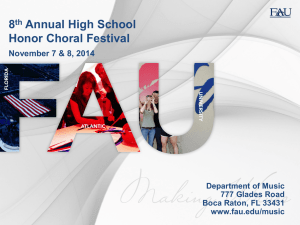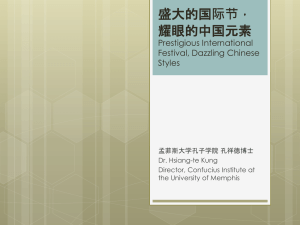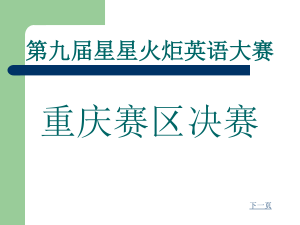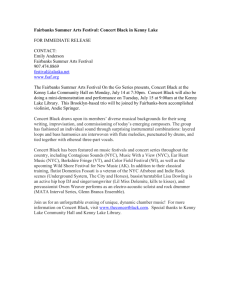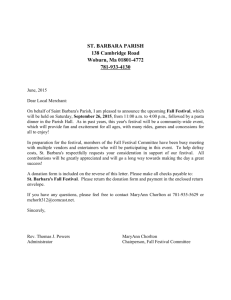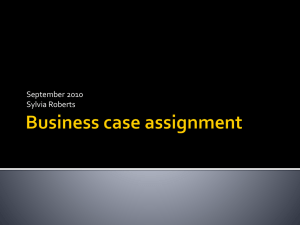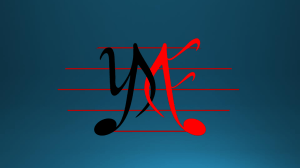A personal review It was really one of the greatest chamber music
advertisement
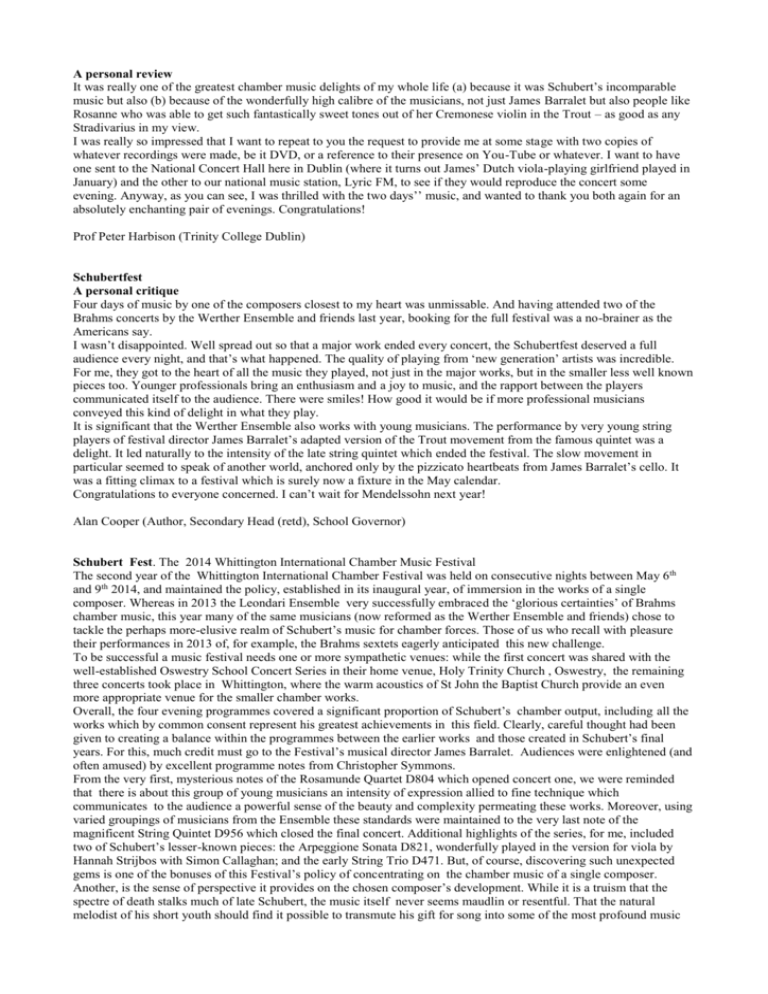
A personal review It was really one of the greatest chamber music delights of my whole life (a) because it was Schubert’s incomparable music but also (b) because of the wonderfully high calibre of the musicians, not just James Barralet but also people like Rosanne who was able to get such fantastically sweet tones out of her Cremonese violin in the Trout – as good as any Stradivarius in my view. I was really so impressed that I want to repeat to you the request to provide me at some stage with two copies of whatever recordings were made, be it DVD, or a reference to their presence on You-Tube or whatever. I want to have one sent to the National Concert Hall here in Dublin (where it turns out James’ Dutch viola-playing girlfriend played in January) and the other to our national music station, Lyric FM, to see if they would reproduce the concert some evening. Anyway, as you can see, I was thrilled with the two days’’ music, and wanted to thank you both again for an absolutely enchanting pair of evenings. Congratulations! Prof Peter Harbison (Trinity College Dublin) Schubertfest A personal critique Four days of music by one of the composers closest to my heart was unmissable. And having attended two of the Brahms concerts by the Werther Ensemble and friends last year, booking for the full festival was a no-brainer as the Americans say. I wasn’t disappointed. Well spread out so that a major work ended every concert, the Schubertfest deserved a full audience every night, and that’s what happened. The quality of playing from ‘new generation’ artists was incredible. For me, they got to the heart of all the music they played, not just in the major works, but in the smaller less well known pieces too. Younger professionals bring an enthusiasm and a joy to music, and the rapport between the players communicated itself to the audience. There were smiles! How good it would be if more professional musicians conveyed this kind of delight in what they play. It is significant that the Werther Ensemble also works with young musicians. The performance by very young string players of festival director James Barralet’s adapted version of the Trout movement from the famous quintet was a delight. It led naturally to the intensity of the late string quintet which ended the festival. The slow movement in particular seemed to speak of another world, anchored only by the pizzicato heartbeats from James Barralet’s cello. It was a fitting climax to a festival which is surely now a fixture in the May calendar. Congratulations to everyone concerned. I can’t wait for Mendelssohn next year! Alan Cooper (Author, Secondary Head (retd), School Governor) Schubert Fest. The 2014 Whittington International Chamber Music Festival The second year of the Whittington International Chamber Festival was held on consecutive nights between May 6 th and 9th 2014, and maintained the policy, established in its inaugural year, of immersion in the works of a single composer. Whereas in 2013 the Leondari Ensemble very successfully embraced the ‘glorious certainties’ of Brahms chamber music, this year many of the same musicians (now reformed as the Werther Ensemble and friends) chose to tackle the perhaps more-elusive realm of Schubert’s music for chamber forces. Those of us who recall with pleasure their performances in 2013 of, for example, the Brahms sextets eagerly anticipated this new challenge. To be successful a music festival needs one or more sympathetic venues: while the first concert was shared with the well-established Oswestry School Concert Series in their home venue, Holy Trinity Church , Oswestry, the remaining three concerts took place in Whittington, where the warm acoustics of St John the Baptist Church provide an even more appropriate venue for the smaller chamber works. Overall, the four evening programmes covered a significant proportion of Schubert’s chamber output, including all the works which by common consent represent his greatest achievements in this field. Clearly, careful thought had been given to creating a balance within the programmes between the earlier works and those created in Schubert’s final years. For this, much credit must go to the Festival’s musical director James Barralet. Audiences were enlightened (and often amused) by excellent programme notes from Christopher Symmons. From the very first, mysterious notes of the Rosamunde Quartet D804 which opened concert one, we were reminded that there is about this group of young musicians an intensity of expression allied to fine technique which communicates to the audience a powerful sense of the beauty and complexity permeating these works. Moreover, using varied groupings of musicians from the Ensemble these standards were maintained to the very last note of the magnificent String Quintet D956 which closed the final concert. Additional highlights of the series, for me, included two of Schubert’s lesser-known pieces: the Arpeggione Sonata D821, wonderfully played in the version for viola by Hannah Strijbos with Simon Callaghan; and the early String Trio D471. But, of course, discovering such unexpected gems is one of the bonuses of this Festival’s policy of concentrating on the chamber music of a single composer. Another, is the sense of perspective it provides on the chosen composer’s development. While it is a truism that the spectre of death stalks much of late Schubert, the music itself never seems maudlin or resentful. That the natural melodist of his short youth should find it possible to transmute his gift for song into some of the most profound music for strings is one of the great mysteries. In the Adagio and later in the Trio of the String Quintet, for example, the sound transcends notes on paper (or bows on strings) to become something unearthly yet consolatory. All the concerts were well attended (more so than in 2013) and, it is no exaggeration to say, rapturously received . While in large part this was due to the uniformly high musical standards, it also reflected greater professionalism by the organisers, building on the achievements of the 2013 Festival. From the range of sponsors both local and national and the enthusiastic reactions of a growing audience, the Festival (which plans to celebrate Mendelssohn in 2015) looks set fair to becoming a fixture in the musical life of North Shropshire and the Welsh borders. I believe there is the potential for it to become even more widely known through the issue of recordings of many of these performances. Finally, tribute must be paid to participation by the Ensemble in the wider local community during the week of the Festival. Somehow, between concerts and rehearsals, members found time to work with Derwen College, to talk with the Oswestry branch of U3A and to rehearse local school children. The first of these involved collaboration with the Wigmore Hall’s Ignite Ensemble and led to a (free) lunchtime concert, while the last led to a spirited performance with the children, as part of the final evening concert, of an arrangement of the Die Forelle variations from the fourth movement of ‘The Trout’ Piano Quintet. Prof Ian Stanley Review of Schubertfest Following on the success of the Whittington International Chamber Music’s inaugural Festival last year, during which the whole of Brahms’ chamber music was performed, the artistic director and cellist James Barralet and his ensemble has recently treated the area’s music-lovers to another glorious festival of music, featuring exclusively the sublime chamber music of Schubert. Altogether, the ensemble totalled eight players, the core of which is the Werther Quartet. Hailing from the UK, Holland, Germany and Canada, these consummate musicians, in a variety of combinations, played over the four evenings some of the choicest of Schubert’s music. Highlights included the three final (and greatest) string quartets, the ‘Trout’ Piano Quintet, the Arpeggione Sonata and the Piano Trio in B Flat, but they surely saved their very best until the very end – the incomparably beautiful String Quintet. The hushed and intense playing of the slow movement revealed playing of the greatest awareness and sensitivity, and was deeply moving. One of the loveliest features of this burgeoning festival is the very obvious rapport and warmth of friendship between the musicians themselves – always a primary requirement where chamber music is concerned – something they communicate well to the audience. Of course, their musicianship matches this, and, as the week progresses, it becomes obvious to all that their own appreciation of the chosen composer is deepening, thanks to the saturation: indeed, all concerned, players and audience, become caught up in the idiom, period and feeling of the composer in a way that a more conventionally varied programme does not allow to happen. The standard of performance was deeply impressive, playing that would have graced any festival in the country, and the large nightly audiences responded accordingly. How good to see near-capacity all week! Once again, there were extras that helped add to the excitement and variety: the opening concert, as last year, was a collaboration with Oswestry School Recital Series, in which the large Holy Trinity Church audience was treated to two of the string quartets. The remaining concerts were all held in the home venue, Whittington’s delightful church, St John the Baptist, where it was increasingly apparent that many of the locals were turning out to help – car parks, interval bar, stewarding etc – something that is also helping towards the community of Whittington beginning to feel a kind of ‘ownership’ of the festival, which again augurs well for the future. Another impressive feature was the inspiring work done by the Wigmore Hall’s ‘Ignite’ Learning Team, who worked with a group of very obviously talented students from the Derwen College. Their lunchtime presentation of a ‘prepared’ improvisation on themes from the Great War was both delightful and moving, as evidenced by the cheering audience –and performers alike! Finally, in the closing concert, several local children joined the professionals for an adapted ‘Trout’ performance. Again, a thoughtful and successful addition, and much enjoyed. This new venture is a really wonderful boost for what is already a thriving professional classical musical scene in and around Oswestry, already blessed with the Oswestry School Series, the Llanfyllin Allegri Quartet Festival, the Gregynog Festival and the Shropshire Music Trust. I have no doubt that next year’s festival – centring on the music of Mendelssohn – will be equally delightful, and am already digging out my scores! Do come! Christopher Symons, Director of Oswestry School Recital Series

